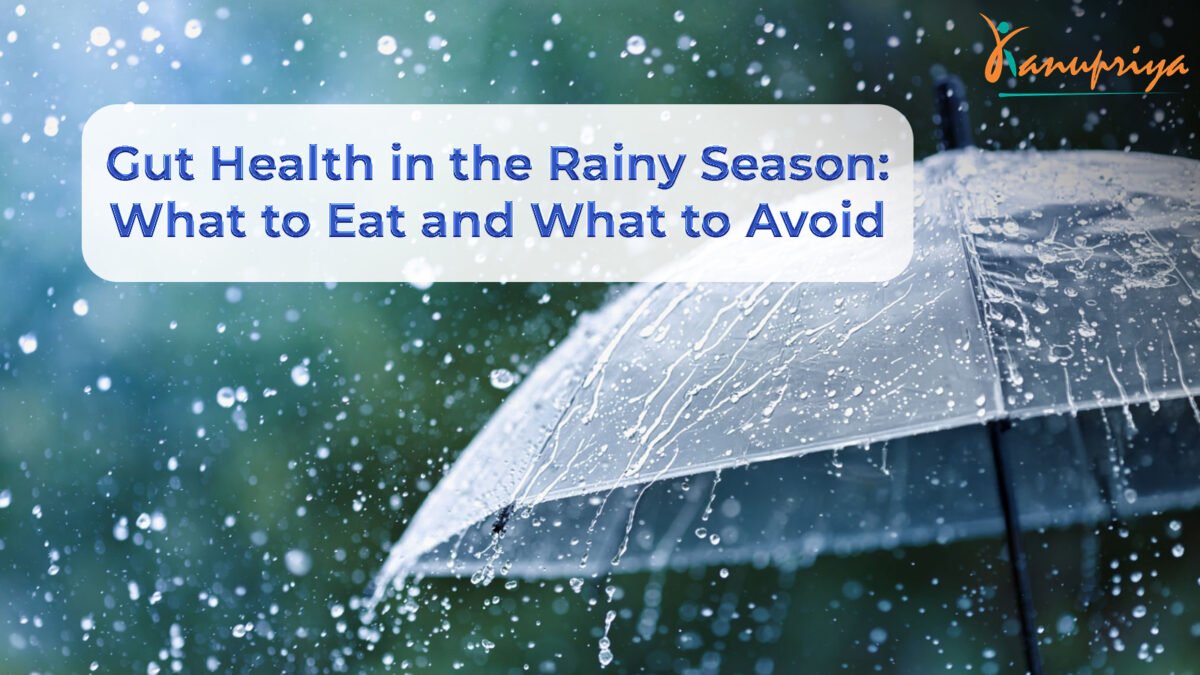By Kanupriya Khanna | Nutritionist & Dietitian
As the monsoon sets in, bringing relief from the scorching summer heat, it also brings with it an increase in humidity, water contamination, and microbial activity. For many, this change in weather triggers digestive troubles — bloating, gas, indigestion, acidity, and infections become far too common.
Why does this happen? And what can we do nutritionally to protect our gut? Let’s break it down with Kanupriya Khanna, India’s best nutritionist and dietitian.
Why Is the Gut Vulnerable During Monsoon?
The digestive system tends to weaken during the rainy season due to:
▪️ Lower Digestive Fire
In Ayurveda, it is believed that the body’s agni (digestive fire) is at its lowest during the monsoon, which can reduce our ability to digest food properly.
▪️ Bacterial Overgrowth
Warm, damp conditions allow bacteria, viruses, and parasites to thrive — increasing the risk of infections like gastroenteritis or food poisoning.
▪️ Water & Food Contamination
Rainwater often seeps into the food supply chain — contaminating fresh produce, raw salads, and even street food, making them unsafe for consumption.
Common Gut Issues During the Rainy Season
- Bloating and gas
- Acidity and reflux
- Diarrhoea or loose motions
- Constipation due to dehydration or low fibre intake
- Nausea or lack of appetite
- Gut infections due to contaminated food or water
Gut-Friendly Foods to Eat in Monsoon
Support your gut and immunity by focusing on light, warm, and nourishing foods. These are easy to digest and help restore microbial balance.
Warm, Cooked Foods
Lightly spiced khichdi, dal with rice, vegetable soups, and porridges are ideal. Cooking helps kill pathogens and makes food easier on the stomach.
Steamed or Lightly Sautéed Vegetables
Avoid raw salads. Steaming vegetables like bottle gourd, ridge gourd, carrots, and beans reduces the risk of contamination while preserving nutrients.
Fermented Foods (in moderation)
Homemade curd, kanji, or buttermilk can help replenish good bacteria — but only if your gut isn’t already inflamed or infected.
Herbal Teas & Spices
Ginger, fennel, cumin, ajwain (carom seeds), and turmeric are powerful digestive aids. Sip on warm water or herbal teas infused with these to reduce bloating and boost immunity.
Rock Salt or Black Salt
In small amounts, these aid digestion and reduce water retention compared to regular salt.
Easily Digestible Grains
White rice, millet (like jowar), and quinoa are gut-soothing and gluten-free, making them easier to digest during monsoon.
Foods to Avoid During Monsoon
Raw Leafy Greens
While healthy in other seasons, leafy greens like spinach and lettuce often trap moisture and become breeding grounds for microbes.
Fried and Oily Foods
Samosas, pakoras, and other fried snacks may be tempting but are harder to digest and increase acidity and sluggishness.
Street Food & Cut Fruit
Often exposed to open air and contaminated water, these are high-risk for infections during this season.
Excessive Dairy
Curb heavy dairy items like paneer, cream, or cheese if you’re prone to bloating. Opt for lighter forms like homemade curd.
Excessively Cold Drinks
Chilled water, cold sodas, and iced drinks shock the digestive system and dampen agni — best avoided.
Bonus Tips for Gut Wellness This Monsoon
- Drink only boiled or filtered water
- Wash fruits and vegetables thoroughly with clean water and soak in vinegar or baking soda rinse
- Eat smaller meals more frequently
- Ensure hygiene in the kitchen and food storage
- Get some daily movement to stimulate digestion
In Conclusion
A happy gut is the foundation of strong immunity and good health — especially during monsoon, when the risk of digestive imbalance is at its peak. By being mindful of what we eat and how we prepare it, we can strengthen our digestion, prevent infections, and feel light and energised even on the rainiest days.
Stay warm, eat clean, and nourish your gut this monsoon. Want to know more? Book a free consultation with Kanupriya Khanna, India’s best nutritionist and dietitian, and take the first step towards better health.

